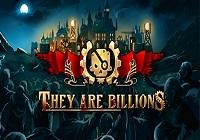They Are Billions (PlayStation 4) Review
By Eric Ace  16.12.2019
16.12.2019

They Are Billions was first seen on Steam Early Access in 2017, with an interesting premise of a city builder, and a sort of survival game taking place in a post-apocalypse. In a world that has been overrun by zombies, a small city must grow and develop fast to survive the ever-increasing waves of zombies. The task may be simple: survive only a couple of months... but with thousands of zombies, survival is not guaranteed with the whole infected world coming in.
They Are Billions is a steampunk, post-apocalyptic, survival city builder, yes that is a lot of genre tag descriptions there, but this oddly works in the way it all comes together. With the general premise of having one small city, the player must expand against a wave of oncoming zombies, and with any slips in defences, cities can become infected and the whole city can fall apart. It is a pause-able, real-time strategy affair, so often you will pause to give orders, start new buildings, or technology, and then let everything play out. This game was originally for the PC, so while there are some shortcuts on the controller, a lot of the clicking and aiming with the cursor is hard but passable. This is actually one of the issues at hand which will come into play later on.
Starting with just one building, would-be survivors must slowly expand to find more resources, more building space, and choke points to defend. There are a lot of resources to manage, and the interplay is a little hard to get the true grasp of. It is a little complicated, so let's try to dig into it. There are three primary resources which are workers, food and energy. There is what could be called 'useable resources,' which are gold, wood, stone, steel and oil. There is also a colonist resource, but that is less important.
The way this works is as follows, ANY building requires some amount of workers, food and energy. For example, a defensive shock tower is going to use a lot of energy, but still some of the other two. These three provide a constant strain that forces the player to have to expand to build more and more houses, farms, and power stations respectively.

In between this, the other resources have to be gathered because many units or upgrades need these specific resources. As the age advances, steel and oil replace wood and stone, which are a balance to maintain which to focus on. To put a point on it, the pressure is that there are going to be hundreds of buildings that have to be built, all taking up room, which cause borders and boundaries to be pushed further and further into the wasteland. What this means is that natural choke points have to be expanded past to make more room for the new buildings, resources and units. This takes us to the next major part of the game: the zombie waves.
Every week or two in game a huge zombie wave will randomly descend on the city. With a brief alert, hundreds of zombies will slowly start marching at the city, ready to claw through walls and get the vulnerable buildings inside. The only way to stop this is through clever walls, some defensive towers and some units. This is definitely the better part of the game, and some of the other parts just get in the way of this defensive section. When they start coming in, despite each one being weak, eventually they will tear through the walls, and it becomes a frantic race of trying to send more resources over to try to stem the tide. In a way it is similar to the anime Attack on Titan with the feeling of the walls being breached.
The map itself is fairly bland, some forests and lakes, some weird looking rocks and ore deposits and an oil slick that looks more like a hot springs. Between waves, sending out some units to explore can find some small resource caches. One of the few notable cool things about the map is finding a different over-run city. The ruins spawn endless zombies and are hard to take down, but the idea that 'someone else' out there didn't make it was a cool addition. Unfortunate aspects like this are fairly rare outside an occasional abandoned truck or something similar.
A play-through is great fun, excluding some issues that hold it back. It is clear this was designed for PC, and the port to console is rough to put it bluntly. Using the stick to try to emulate a mouse never works good, and the absolute raw amount of precise clicking really slows the game down when it takes a second here and there to nudge the 'mouse' over a few pixels - now multiple this by a thousand.

Other issues include the very bad slow-down when zombies are attacking, or during certain building segments. For such a graphically simple game, the slowdown is inexcusable. Lastly, there are just some bad UI and graphic choices. Colonists, for example do not really do anything, and the thousands of them are rendered across the city, providing far unnecessary clutter and lag. They literally do nothing as their role is calculated elsewhere, and they are immune to zombies, making their appearance completely unnecessary. Also, everything is the same washed out brown colour, which makes it tough at a glance to figure out where anything is, thus separating buildings and units alike is a problem.
These issues aside, this was a great play. It does not feel like there is much in terms of replay, as everything there is to see can be seen within a single run. Furthermore, there is very little difference in strategies that are viable; the same units and buildings must be built in order to survive. Someone interested in a unique take on a city builder will probably enjoy a romp through the game. A play will probably take 15-20 hours especially if they have to pause a lot to get the buildings right.

Cubed3 Rating
Very Good - Bronze Award

They Are Billions does a lot of things great. The survival twist of a city-builder is unique, and lots of fun. Dealing with the huge waves is always as fun as it is stressful, including the huge final waves. Things that hold the game back are difficulty playing a computer game on console controls, and various UI and graphics issues as well as slowdown. This being said, it's a solid and unique RTS title.

![]() 7/10
7/10
![]() 0
(0 Votes)
0
(0 Votes)
 Out now
Out now  Out now
Out now  Out now
Out now  Out now
Out now Comments
Comments are currently disabled

 Sign In
Sign In Game Details
Game Details Subscribe to this topic
Subscribe to this topic Features
Features





 Top
Top

